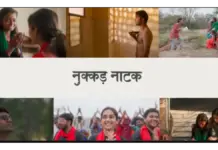Click https://bit.ly/komal341 if the above video does not autoplay.
Vibri Motion Pictures, Karma Media & Entertainment, Gothic Entertainment and Sprint Films’ Thalaivii is the story of late Tamil Nadu chief minister J. Jayalalithaa. It is based on Ajayan Bala’s book Thalaivi.
The story traces the life of Jayalalithaa from the time she became a film star, covers her affair with the then reigning superstar of Tamil cinema, MGR, and finally, describes her foray into politics.
Jaya (Kangana Ranaut) is a young girl who is trying her luck in the Tamil film industry. One day, she gets lucky when she is signed for a film opposite MJR (Arvind Swami). Soon, the married MJR and Jaya become very fond of each other and before long, they are in love. MJR’s secretary and also a producer in his own right, RNV (Raj Arjun), resents Jaya’s closeness to MJR for fear that it may adversely affect the latter’s image. As time passes by, MJR enters active politics and soon forms his own party after a fallout with Tamil Nadu chief minister M. Karunanidhi (Nassar). After becoming the chief minister, how MJR initiates Jaya into politics and what happens thereafter form the crux of the latter part of the story. What happens to Jaya and MJR’s love story?
Vijayendra Prasad’s story, based on the real-life story of Jayalalithaa, is both, interesting and engaging. Although it deals with regional politics, the human drama appeals to a pan-India audience because even if this were not the story of Jayalalithaa, it would be a good base for a film. The screenplay, written by Vijayendra Prasad and Rajat Aroraa, is excellent. Although the film is quite lengthy, the screenplay keeps the audience’s interest alive. This is because the writers have written a humane drama which also has melodrama, emotions, rivalry, jealousy, romance, and much more. Yes, the masses may find the political drama a bit too heavy at times but the class audience and the families would love it. The names of the various political parties and characters as well as actors are mostly South Indian, which is a drawback for the non-South Indian audience. The first half is devoted to the rise of Jaya as an actress and to her affair with MJR. It is light-hearted at places and intense at others. Overall, it leaves the viewers satisfied and entertained. The drama becomes more serious after interval but it moves at a good pace and, therefore, never loses its grip on the viewers.
There are a number of scenes which are beautifully conceived and exceptionally written and narrated. For instance, the scene in which Jaya and MJR go on a long drive and then MJR tells Jaya something that leaves her distraught; the scene in which Jaya complains to MJR about his mid-day meal scheme and the action he takes thereafter; the scene in which the intern doctor tells Jaya why she was concerned for her (Jaya’s) health; the scene in which Jaya does the impossible in her interaction with Indira Gandhi; the scene in which Jaya keeps dinner ready for MJR and waits for hours together for him to arrive; the scenes where Jaya and RNV (MJR’s manager) play the oneupmanship game with each other; the dance recital of Jaya after she is no longer in demand as a heroine… There are many such scenes which show the brilliance of the writers.
Rajat Aroraa’s dialogues are extraordinary. They are weighty and add a lot to the outstanding screenplay.
Kangana Ranaut is phenomenal in the title role. She gives her cent per cent to the character of Jaya. The character has many layers and it is sheer delight to watch Kangana go through the role with exemplary ease. Indeed, it is difficult to imagine any other actress in the role, so overpowering is Kangana. She looks beautiful too. Special mention must be made of her sarees (costume designer Neeta Lulla) which are eye-catching. Arvind Swami lives the role of MJR and is extremely endearing. He acts with effortless ease. Raj Arjun lends remarkable support as RNV. His expressions are to die for. Nassar is natural in the role of M. Karunanidhi. Madhoo is graceful as MJR’s second wife, Janaki. Of course, she gets very limited screen time. Bhagyashree, also in a brief role, leaves a mark as Jaya’s mother. Thambi Ramaiah has his moments as Madhavan. Poorna (as Shashi) stands her own. Manikandan (as Murthy), Radha Ravi (as Radha), Jayakumar (as Vaiko) and Shanmugarajan (as Valampuri John) provide very good support. Others are adequate.
Vijay’s direction is fantastic. He has narrated the drama so interestingly that although it is the story of one state in South India, it would appeal to the audience across the country. Of course, too many South Indian faces and South Indian names will definitely mar the impact, to quite an extent, for the audience in other parts of India. G.V. Prakash Kumar’s music is melodious but the songs have not become popular. Irshad Kamil’s lyrics are appealing. Choreography (by Chinni Prakash, Rekha Chinni Prakash, Brinda, Gayathri Raghuram and Nagendra Prasad) is very good and some dances transport the viewers to an era gone by. Background music (G.V. Prakash Kumar) is supremely effective. There are several scenes in which dialogues are used minimally, but the wonderful background score conveys the mood. Vishal Vittal’s cinematography is of a wonderful order. Stunt Shiva’s action scenes are very real. Production designing (S. Ramakrishna and Monika Nigotre) is excellent. Ballu Saluja’s editing is sharp.
On the whole, Thalaivii is an entertaining human drama which will be loved by the classes and the families but not as much by the masses. Unfortunately, its business will not at all be commensurate with its merits because the three biggest national multiplex chains (PVR, Inox and Cinepolis) have refused to screen the film (as it will be premiered digitally after two weeks of its theatrical release instead of four weeks desired by the said multiplex chains). Rather, the theatrical business will be poor. Cinemas functioning at 50% capacity in most of the states, night-show restrictions in many states, cinemas in Maharashtra still being shut due to the pandemic lockdown restrictions, fear of the third wave of Coronavirus, of course, will also tell on the business of the film. The publicity given to the fact that the film will be available on Netflix after just two weeks will work against the box-office business of the film because many among the public will prefer to wait for two weeks rather than risk it out to the cinemas in the face of fear of the third wave.
Released on 10-9-’21 all over except in Maharashtra, Assam and Kerala. Publicity: fair. Opening: below the mark. …..The Tamil and Telugu (dubbed) versions have also been released in South.





























